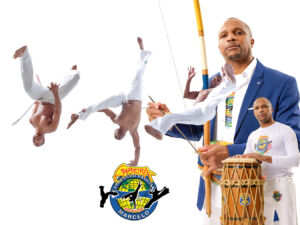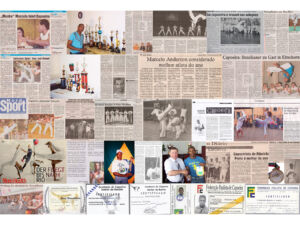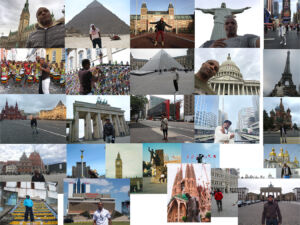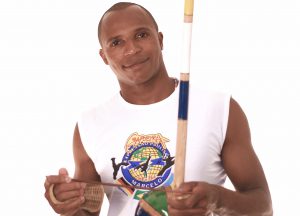Mestre Marcelo
Mein Leben in der Capoeira
Ich habe schon im Alter von 9 Jahren in Ribeirão Preto, São Paulo, mit Capoeira begonnen. Durch den Ansporn meines Bruders José Mario Cândido (Mestre Fumaça) machte ich meine ersten Schritte in der Welt der Capoeira unter der Leitung von Mestre Euclides ( Mestre Oripim ).
Damals war mein Bruder nicht in der Stadt, so dass ich nicht bei ihm anfangen konnte. Mestre Oripim schulde ich all meine Dankbarkeit, mir die ersten Bewegungen beigebracht zu haben. Genau 1 Jahr später kam mein Bruder in unsere Stadt zurück und ich wechselte in seine Sportschule. Mestre Oripim wird jedoch immer mein erster Mestre bleiben, der mir Einblicke in eine etwas andere Trainings- und Lernphilosophie verschaffte, durch die ich mich bei Mestre Fumaça, der die Capoeira bis heute 24 Stunden am Tag lebt, schneller eingewöhnen konnte; hatte ich doch schon fast den gleichen Lebensrhythmus angenommen.
Die Capoeira wurde zur Priorität in meinem Leben. Meine Stunden auf der Schulbank und mein Training in der Sportschule bestimmten meine ganze Kindheit.
1992 erhielt ich den Grad des Lehrers (Professor), fühle mich jedoch bis heute als Schüler, da ich ständig Neues erlernen möchte und immer neue Herausforderungen konfrontiere.
1997 wurde ich offiziell durch meine Mestres und den Brasilianischen Capoeira Verband ( CBC ) zum Contra-Mestre graduiert. Mit dieser Kampfkunst, diesem Ausdruck von Kultur, hatte und habe ich immer die Gelegenheit, Brasiliens Capoeira in vielen Ländern der Welt zu repräsentieren und etliche Freundschaften zu schließen.
1993 wurden wir Mitglieder im CBC ( Confederação Brasileira de Capoeira ), dem Brasilianischen Capoeira Verband, um von dessen Arbeit, aus Capoeira einen Nationalsport zu machen und die Philosophie des Sklavenvolkes zu erhalten, das sich seine Freiheit kämpfend erobert hat, zu profitieren. Bereits durch das Internationale Olympische Komitee (IOC) anerkannt, wird in der Capoeira mit den Techniken in Wettkampfform gearbeitet, um olympische Sportart zu werden.
Meine persönliche Entwicklung in der Capoeira als Wettkampfsport wurde zu einem großen Erfolg. Ich bin Mitglied der Brasilianischen Nationalmannschaft, fünffacher Brasilianischer Meister (´95 – 2000) und wurde 1996 durch das Brasilianische Olympische Komitee ( COB ) als bester Sportler des Jahres ( Capoeira ) ausgezeichnet.

My Capoeira Life
I began to train capoeira at the age of nine in Ribeirão Preto, São Paulo. Due to the incentive of my brother, José Mario Cândido, I did my first steps in the world of capoeira, supervised by Mestre Euclides (Mestre Oripim). By this time, my brother was not living in our city, that is why I could not start learning capoeira from him. I am very grateful that Mestre Oripirim taught me the first capoeira moves like Ginga, Aú and many more. Exactly a year after this, my brother came back into town and I went to his school of capoeira. Mestre Oripirim will always be my first Mestre, though, who gave me an insight of a somewhat different methodology of learning and training, which helped me getting used to Mestre Fumaça.Up till today, he is living capoeira at 24 hours a day and I already had almost reached the same rhythm of live. The capoeira became the priority in my live. The hours I spent in school and training in the school of capoeira determined my childhood. In 1992, I received the first degree of teacher (professor), but up until today I feel I am still a student, for I am always willing to learn new things and I am always confronting new defiances. In 1997, I was officially made Contra-Mestre by my mestres and the Brazilian Confederation of Capoeira (CBC). My own work with this martial art is shaped by the idea of imparting the whole world of Capoeira to my students: The history, the tradition, the game of regional and angola, the singing, playing the instruments and the respect for the corporal integrity of the partner, all this to become good teachers, respected and acknowledged in the whole world. With this martial art, this expression of culture I always had and continue having the opportunity of representing Brazil’s capoeira in many countries and of making lots of friends. In Brazil, people practice capoeira since the 17th century. Its origins lie in the “senzalas” (slave cabins) where practicing any kind of fight was forbidden. The movements were transformed and hidden in some kind of dance, so that they could practice this sort of self defense. In 1993, we became members of the CBC (Confederação Brasileira de Capoeira), the Brazilian Cofederation of Capoeira, to benefit from its work of making capoeira a national sport and maintain the culture of this people of slaves, that conquered its liberty by fighting. Already accepted by the IOC (International Olympic Committee), in capoeira we work with techniques of competition to become an olympic sport. My personal development in the capoeira as competition was a big success. I am member of the Brazilian Nacional Team of Capoeira, five-time Brazilian Champion (1995-2000) and in 1996 I have been awarded best athlete (capoeira) by the Brazilian Olympic Committee (COB). The biggest advantage of this sport is the improvement of your own quality of life: coordination, good reflexes, ability, inner balance, sociability, flexibility and the playing the instruments. This is capoeira, the culture learned through vitality and joy.

Minha Vida na Capoeira
Comecei com a capoeira na idade de nove anos em Riberão Preto, São Paulo. Incentivado por meu irmão José Mario Cândido (Mestre Fumaça) dei meus primeiros passos no mundo da capoeira, na supervisão do Mestre Euclides (Mestre Oripim). Nessa época, meu irmão não estava na cidade, por isso eu não podia ter começado com ele. Agradeço ao Mestre Oripim por me ensinar os primeiros movimentos, a ginga, o aú e outros. Um ano depois, meu irmão voltou para nossa cidade e eu mudei para a academia dele. Mesmo assim, Mestre Oripim será sempre meu primeiro Mestre, que me mostrou uma filosofia de treino e ensino um pouco diferenciado e graças a isso me adaptei rapidamente com Mestre Fumaça que até hoje vive a capoeira 24 horas por dia, pois eu já tinha quase atingido o mesmo modo de vida. A Capoeira virou a prioridade da minha vida. As horas que passei na escola e o treino na academia determinaram a minha infância. Em 1992, recebi a graduação de professor, mas me sinto aluno até hoje, pois quero aprender sempre coisas novas e estou enfrentando sempre novos desafios. Em 1997, fui oficialmente graduado Contra-Mestre por meus mestres e o CBC. Meu próprio trabalho com essa arte luta é marcada pela filosofía de passar o mundo inteiro da capoeira aos alunos: a história, a tradição, o jogo de regional e angola, o canto, os instrumentos, tanto como o respeito da integridade física do parceiro, para fazer eles bons professores, respeitados e aceitos no mundo inteiro. Com essa arte luta, essa expressão de cultura, sempre tenho a oportunidade de representar a capoeira do Brasil em muitos países do mundo e fazer vários amigos. No Brasil, pratica-se capoeira desde o século XVII. Ela tem as suas origens nas senzalas, onde era proibido os habitantes praticarem qualquer tipo de luta. Os movimentos foram modificados e escondidos na música e um tipo de dança, para que se pudesse praticar essa defesa pessoal. Em 1993 viramos membro da CBC (Confederação Brasileira de Capoeira) para aproveitar do trabalho deles de fazer da capoeria um esporte nacional e receber a filosofía do povo de escravos que conquistou a liberdade lutando. Aceita pelo IOC, a capoeira trabalha com as tecnicas da competição para virar um esporte olímpico. O meu desenvolvimento pessoal na capoeira como esporte competitivo foi bem sucedida. Sou membro do time nacional, pentacampeão brasileiro (1995-2000) e 1996 fui nomeado melhor atleta (Capoeira) do ano pelo COB. A melhor vantagem nesse esporte é que melhora a qualidade de vida: a coordenação motora, bons reflexos, habilidade, equilibrio mental, sociabilidade, flexibilidade e os instrumentos. Isso é a capoeira, a cultura, que se aprende com alegria e prazer.

ie interessant! Capoeira ist eine brasilianische Kampfkunst, die Elemente aus Tanz, Musik und Akrobatik kombiniert. Mit Meister Marcelo in Hamburg sollte der Unterricht sehr authentisch und bereichernd sein. Es ist eine großartige Gelegenheit für Menschen jeden Alters zu lernen und gleichzeitig Spaß zu haben. Denken Sie über eine Teilnahme nach oder kennen Sie jemanden, der interessiert ist?


